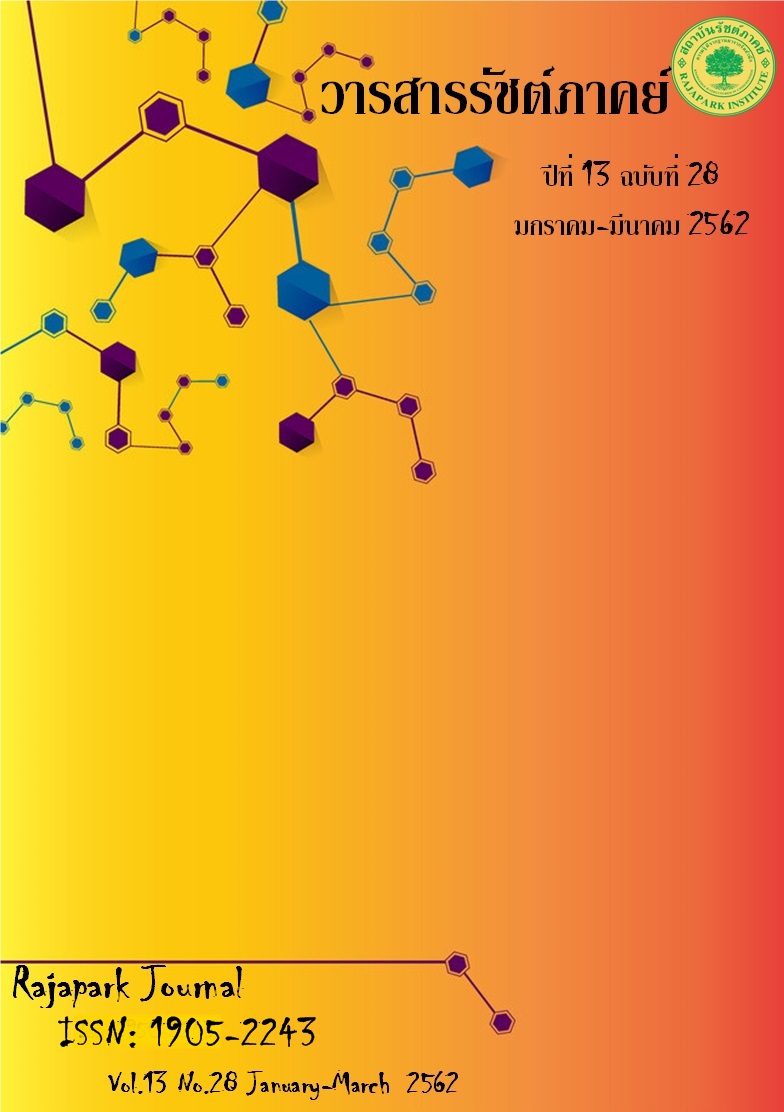Development of the Intelligence Training Program of Royal Thai Army for Resolving Insurgency in Southern Area
Main Article Content
Abstract
This research was aimed to develop the intelligence training program of Royal Thai Army for resolving insurgency in the southern area. The research was divided into 4 steps, i.e., 1) the preparation of the development of the intelligence training program, 2) the survey of crucial intelligence skills towards resolving internal security, 3) the development of the intelligence training program, and 4) the evaluation of contents and efficiency of the intelligence training teams of the intelligence training program. The samples of the research included commissioned and non-commissioned officers in the southern area in B.E. 2556 through multi-stage random sampling during the survey step in order to create the training program from the 3 battalion units that used to operate in the southern area in B.E. 2556. There were 12 commissioned officers and 9 non-commissioned officers (total 21). At the evaluation step, purposive sampling was brought to select 9 experts. Research instruments consisted of the assessment of intelligence training teams in the southern area. According to the findings, 4 intelligence training teams were generated, namely, (1) the intelligence preparation of battlefield team, (2) the deception training team, (3) the intelligence source training team, and the counterintelligence training team. Regarding the evaluation of contents and efficiency of the intelligence training teams, it was found that the entire 4 intelligence training teams possessed high efficiency and suits to be tested for resolving insurgency in the southern area in the future.
Article Details

This work is licensed under a Creative Commons Attribution-NonCommercial-NoDerivatives 4.0 International License.
Views and opinions appearing in the Journal it is the responsibility of the author of the article, and does not constitute the view and responsibility of the editorial team.
References
Bandura, A. (1989). Social cognitive theory. Retrieved August 3, 2013, from http://www.uky.edu/~eushe2/Bandura/Bandura1989ACD.pdf
Chan-ocha, P. (2008). Thai army and new forms of threats, Type 1. Bangkok: Political Science Association, Kasetsart University Project to support the development of democracy and public politics.
Community Foundations of Canada. (n.d.). Learning, Training & Development. Retrieved July 25, 2013, from http://hrcouncil.ca/hr-toolkit/learning-understanding.cfm
Fred, C.L. (2011). “Expectancy Theory of Motivation: Motivating by Altering Expectations.” International Journal of Management, Business and Administration 15(1), 15.
Knowles, M.S. (1980). The modern practice of adult education: From pedagogy to andragogy. Englewood Cliffs: Prentice Hall/Cambridge.
McLeod, S. (2010). Simply Psychology. Retrieved March 5, 2013, from https://www.simplypsychology.org/learning-kolb.html
Papert, S. (1980). Mindstorms. Children, Computers, and Powerful Ideas. New York: Basic Books.
QOTFC. (2007). Adult Learning Theory and Principles. Retrieved March 10, 2013, from https://www.myctb.org/wst/WHOeplatform/06% 20% Global20Courses%20Directory/Global%20Health%20in%20All%20Policies%20Training%20Geneva%202015/Key%20preparatory%20Documents/Adult%20Learning%20Theory%20and%20Principles.pdf
Ratanubol, A. (1999). Adult learning conditions and adult teaching guidelines. Department of Non-Formal Education, Faculty of Education, Chulalongkorn University.
Saksung, O. (2000). An analysis of the consistency between the andragogy theory of Malkallols and the teaching methods in the higher education institution curriculum of the Institute of Educational Management Development. Master's thesis Department of Non-Formal Education, Chulalongkorn University.
Skinner. (1938). Operant Conditioning Expert. Retrieved June 15, 2013, from https://www.bartleby.com/essay/Operant-Conditioning-Expert-Skinner-1938-PKC6P7VKRZKW.
Srisombat, B. (2009). Fourth Generation Warfare. Senathipat Journal, 57(2), 14-2.
Vygotsky. (1978). Reading on the development of children. Retrieved March 15, 2013, from http://www.psy.cmu.edu/~siegler/vygotsky78.pdf


